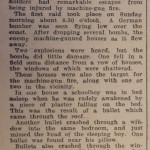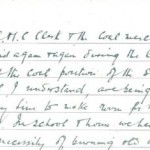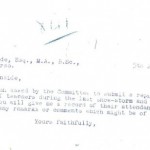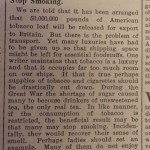Surprised by the ease of his victory in the North African desert last week, Rommel decided to continue the offensive and take all of Libya. As the British continued to retreat eastwards, German forces advanced some 200 miles, capturing Benghazi and Derna. Meanwhile, in Europe, German forces invaded Yugoslavia and Greece. The bombing of British cities continued, and convoy losses continued to mount.
 Caithness was still at constant risk of attack from the air. The John O’Groat Journal reported that two lone raiders had attacked this week, dropping bombs and machine-gunning houses. Early on Sunday morning, “a schoolboy was in bed asleep when he was rudely awakened by a piece of plaster falling on his head. This was the result of a bullet which came through the roof.” When he woke up he found out he was even more fortunate, as other bullets had just missed his head; he found one on his pillow. On Wednesday “a youth cycling to his work flung himself from his bicycle and sought refuge in a ditch when he heard the crack of machine-gun bullets behind him.” Luckily no one was hurt.
Caithness was still at constant risk of attack from the air. The John O’Groat Journal reported that two lone raiders had attacked this week, dropping bombs and machine-gunning houses. Early on Sunday morning, “a schoolboy was in bed asleep when he was rudely awakened by a piece of plaster falling on his head. This was the result of a bullet which came through the roof.” When he woke up he found out he was even more fortunate, as other bullets had just missed his head; he found one on his pillow. On Wednesday “a youth cycling to his work flung himself from his bicycle and sought refuge in a ditch when he heard the crack of machine-gun bullets behind him.” Luckily no one was hurt.
Stemster School in Bower parish had had a difficult winter, as supplies of fuel had not arrived. Now the  exasperated Head Teacher recorded in the log book on 2 April, “The S.M.C. [School Management Committee] clerk and the coal merchant have been notified again & again during the last 6 weeks about the coal position of the school. Waggons of coal, I understand, are being held up on the Railway line to make room for the military exigencies. In school and home we have been reduced to the necessity of burning old wood & old trellis.”
exasperated Head Teacher recorded in the log book on 2 April, “The S.M.C. [School Management Committee] clerk and the coal merchant have been notified again & again during the last 6 weeks about the coal position of the school. Waggons of coal, I understand, are being held up on the Railway line to make room for the military exigencies. In school and home we have been reduced to the necessity of burning old wood & old trellis.”
 The teachers of Thurso School were under scrutiny by the Education Committee regarding recent absences due to the bad weather. On 5 April the Director of Education wrote ominously to the Head Teacher T.G. Ironside, “I have been asked by the Committee to submit a report on the attendance of teachers during the last snow-storm and I shall be obliged if you will give me a record of their attendance in close detail with any remarks or comments which might be of service.”
The teachers of Thurso School were under scrutiny by the Education Committee regarding recent absences due to the bad weather. On 5 April the Director of Education wrote ominously to the Head Teacher T.G. Ironside, “I have been asked by the Committee to submit a report on the attendance of teachers during the last snow-storm and I shall be obliged if you will give me a record of their attendance in close detail with any remarks or comments which might be of service.”
Finally this week, the John O’Groat Journal noted that 50 million pounds of tobacco leaf was to be sent to Britain from America. The writer wondered if this might not be a good opportunity for the nation to break the habit of smoking, in the same way that sugar shortages in the Great War encouraged people to take their tea unsweetened (“the only real tea”). “Incidentally,” the writer concluded, “they would recover their sense of smell. Perhaps ladies should set an example. Many of them do not enjoy smoking anyway.”
from America. The writer wondered if this might not be a good opportunity for the nation to break the habit of smoking, in the same way that sugar shortages in the Great War encouraged people to take their tea unsweetened (“the only real tea”). “Incidentally,” the writer concluded, “they would recover their sense of smell. Perhaps ladies should set an example. Many of them do not enjoy smoking anyway.”
